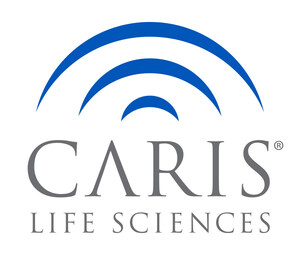Caris Life Sciences' Multiplatform Tumor Profiling Enhances Understanding of Molecular Drivers and Treatment Selection in Uterine Carcinomas
Study Results Featured in Plenary Session at Society of Gynecologic Oncology Annual Meeting
IRVING, Texas, March 30, 2015 /PRNewswire/ -- Caris Life Sciences® today announced the presentation of a study that found drugs targeting specific pathways may have potentially significant benefit in a select subset of patients with uterine cancer. The study results were highlighted today in an oral presentation in a Plenary Session at the Society of Gynecologic Oncology (SGO) 2015 Annual Meeting on Women's Cancer in Chicago, Ill.
This study is one of four presented at the annual meeting that utilizes Caris Molecular Intelligence®, Caris' comprehensive tumor profiling service. The studies collectively demonstrate the genetic and molecular heterogeneity of 3,133 uterine carcinoma samples. Each data set reveal disease biomarkers and mutation patterns that yield insights into targeted treatment strategies not previously considered.
"Uterine cancer is an especially heterogenic gynecological cancer, with numerous subtypes identified," said Sandeep K. Reddy, M.D., Chief Medical Officer at Caris Life Sciences. "These data provide a valuable service in shedding light on patterns of pathway aberration in some of these subtypes, and in demonstrating the value of multiplatform molecular profiling in enhancing our understanding of these cancers."
In the Plenary presentation (abstract #3381), titled "Identification of potential therapeutic targets by molecular profiling of 628 cases of uterine serous carcinoma" researchers evaluated the patterns of molecular, genomic, and protein changes in 628 uterine serous cancer samples using Caris Molecular Intelligence. The study concluded that drugs targeting the PI3K, DNA repair and PD-1/PD-L1 pathways, as well as anthracyclines and hormonal agents may have significant benefit in a subset of patients with this disease.
"Whereas serous uterine cancer is an uncommon but aggressive type of endometrial cancer that is often resistant to traditional cytotoxic chemotherapy, our findings suggest that it is a genetically heterogeneous disease," commented David Spetzler, PhD, Senior Vice President, Research and Development at Caris Life Sciences. "Using multiplatform tumor profiling technologies, we identified numerous potential therapeutic options."
The second study was presented in a Meet-the-Professor session on Saturday, March 28, titled "Molecular characterization of 361 cases of uterine carcinosarcomas reveal alterations in the DNA repair and PI3K pathways as potential therapeutic targets" (abstract #3999). Similarly, researchers used Caris Molecular Intelligence to evaluate and report on the patterns of molecular, genomic, and protein changes in 361 uterine carcinosarcoma (uterine CS) samples, a rare endometrial carcinoma (EC). Also known as malignant mixed Müllerian tumors (MMMT), uterine CSs exhibit aggressive behavior and are associated with poor prognosis.
"These findings contribute to increased understanding of the molecular drivers within uterine cancer," added Spetzler. "Within a large cohort of MMMT tumors, potential pathways that warrant further clinical exploration were identified including those targeting DNA repair, PI3K, and PD-1/PD-L1 pathways. Our data also suggest that alkylating agents and anthracyclines may have benefit in a selected subset of patients."
In the third study presented on Saturday, March 28, titled "Identifying potential therapeutics by molecular profiling of 136 cases of uterine clear cell carcinoma" (abstract #3382), researchers used Caris Molecular Intelligence to identify the molecular, genomic, and protein expression patterns in this cohort of uterine clear cell carcinomas of the endometrium (CCE), a rare subtype of EC associated with worse prognosis when compared to other high-grade EC subtypes. Researchers identified altered cellular pathways with potential diagnostic and predictive values for therapeutic intervention. Drugs targeting the pathways for DNA repair, PI3K, and receptor tyrosine kinases, as well as gemcitabine and taxanes, may warrant consideration in selected patients with this tumor subtype.
In a fourth study presented on Sunday, March 29, titled "Distinct molecular landscapes between endometrioid and non-endometrioid uterine carcinoma" (abstract #4009), researchers used Caris Molecular Intelligence to identify the distinct molecular alterations between histologic subtypes of endometrial carcinoma (EC) as a guide to select biomarker-based treatment strategies. Of the 3,133 tumor samples evaluated, 1,634 were classified as endometrioid (also known as type I) and 1,226 as non-endometrioid (type II) subtypes. The type II samples included tumors of squamous, uterine serous carcinoma, clear cell, mucinous, and carcinosarcoma histology. Despite the molecular heterogeneity among histological subtypes, distinct patterns of pathway aberration in endometrial cancers were identified that may be targeted with further research. Furthermore, the correlation of molecular profiles with clinical outcomes can influence the development of rational guidelines for therapy in individuals with endometrial carcinoma.
About Caris Life Sciences® and Caris Molecular Intelligence®
Caris Life Sciences® is a leading biotechnology company focused on fulfilling the promise of precision medicine through quality and innovation. Caris Molecular Intelligence®, one of the industry's leading tumor profiling services with more than 70,000 patients profiled, provides oncologists with the most potentially clinically actionable treatment options available to personalize cancer care today. Using a variety of advanced profiling technologies to assess relevant biological changes in each patient's tumor, Caris Molecular Intelligence connects biomarker data generated from a tumor with biomarker-drug associations supported by evidence in the relevant clinical literature. The company is also developing Carisome® TOP™ technology, a revolutionary and proprietary blood-based profiling platform for diagnosis, prognosis, and theranosis of cancer and other complex diseases. Headquartered in Irving, Texas, Caris Life Sciences offers services throughout Europe, the U.S., Australia and other international markets. To learn more, please visit www.CarisLifeSciences.com.
SOURCE Caris Life Sciences
Related Links
http://www.carislifesciences.com
WANT YOUR COMPANY'S NEWS FEATURED ON PRNEWSWIRE.COM?
Newsrooms &
Influencers
Digital Media
Outlets
Journalists
Opted In





Share this article